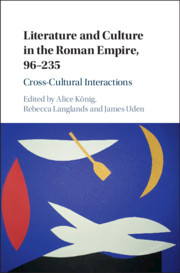Book contents
- Literature and Culture in the Roman Empire, 96–235
- Literature and Culture in the Roman Empire, 96–235
- Copyright page
- Contents
- Figures
- Contributors
- Preface
- Timeline
- Abbreviations
- Map
- Introduction
- Part I Refiguring Roman and Greek Interactions
- Chapter 1 Beyond Romans and Others
- Chapter 2 The Noise-Lovers
- Chapter 3 Plutarch and Roman Exemplary Ethics
- Chapter 4 Patronage, Cultural Difference and Literary Interactivity
- Chapter 5 The Romance of Republican History
- Chapter 6 Tactical Interactions
- Part II Imperial Infrastructure: Documents and Monuments
- Part III Cultural Translation and Transformation
- References
- Index
Chapter 4 - Patronage, Cultural Difference and Literary Interactivity
The Case of Pliny and Plutarch
from Part I - Refiguring Roman and Greek Interactions
Published online by Cambridge University Press: 28 April 2020
- Literature and Culture in the Roman Empire, 96–235
- Literature and Culture in the Roman Empire, 96–235
- Copyright page
- Contents
- Figures
- Contributors
- Preface
- Timeline
- Abbreviations
- Map
- Introduction
- Part I Refiguring Roman and Greek Interactions
- Chapter 1 Beyond Romans and Others
- Chapter 2 The Noise-Lovers
- Chapter 3 Plutarch and Roman Exemplary Ethics
- Chapter 4 Patronage, Cultural Difference and Literary Interactivity
- Chapter 5 The Romance of Republican History
- Chapter 6 Tactical Interactions
- Part II Imperial Infrastructure: Documents and Monuments
- Part III Cultural Translation and Transformation
- References
- Index
Summary
In an analysis that brings together literary, historical, and linguistic perspectives, this chapter examines similarities and differences in the ways that Plutarch and Pliny discuss (or avoid discussing) patronage among elites, asking what the divergences can tell us about the limits of cultural sharing between Greeks and Romans during the early empire. This chapter puts Plutarch’s and Pliny’s silences about elite dependency and interdependency into dialogue with one another by comparing their treatments of closely related topics such as inequality, hierarchy, and obligation. While both authors write openly about inequality and are aware of its social effects, Plutarch is far more concerned than his Roman counterpart about its potentially disruptive results. Likewise, Pliny is markedly more open than Plutarch about ties of obligation among elites. Many factors contribute to these differences, but the most important for this study are the greater reification of obligation in the Latin language and self-conscious cultural differentiation on the part of Greeks within the Roman empire. The chapter’s final section delves deeper into these issues, examining how each author reinforces his larger cultural priorities in respect of unequal friendship and reciprocity through his use of Homeric exempla.
Keywords
- Type
- Chapter
- Information
- Literature and Culture in the Roman Empire, 96–235Cross-Cultural Interactions, pp. 95 - 113Publisher: Cambridge University PressPrint publication year: 2020

